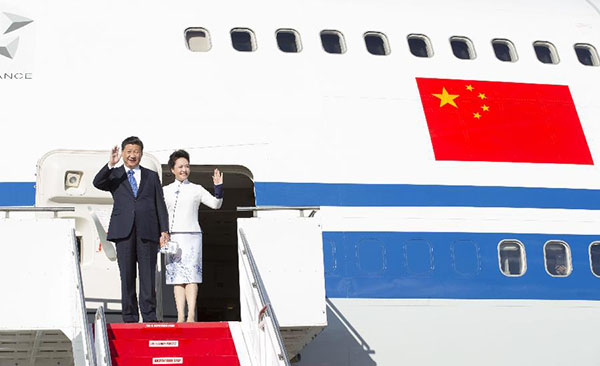ASEAN a neutral platform for all powers
ByKAVI CHONGKIT TAVORN
(China Daily) Updated: 2015-09-24 07:36
 |
|
Chinese President Xi Jinping (L) and his wife Peng Liyuan wave upon their arrival in Seattle, the United States, Sept. 22, 2015. Xi arrived in this east Pacific coast city on Tuesday morning for his first state visit to the US. [Photo/Xinhua] |
Deepening strategic trust must be the top objective of the summit between President Xi Jinping and US President Barrack Obama this week. Sino-US relations have reached a critical point because of the high level of cynicism, which means the world's two largest economies have to properly manage their cooperation and competition.
In today's globalized world of growing economic interdependence, common endeavors are needed to promote sustainable growth. No economy can survive, let alone prosper, on its own. The recent stock market crisis in China once again showed the level of global economic integration is far deeper than economists have anticipated, especially the psychological factor that has now come into play with not-so-good financial consequences.
Therefore, China and the US cannot afford to have continuous misperceptions about each other's intentions, imagined or real. Given their economic standings and political clouts, China and the US yield extraordinary power and influence that can make or break international norms and practices.
To ensure regional stability and deal with sensitive issues, China and the US must build on their past cooperation and achievements. Their collaboration on the Iranian nuclear issue is a good example of how fruitful a meeting of minds between the two powers can be. It took patience and extraordinary efforts to sustain such collaboration.
China is a newcomer to global governance-it is still a work in progress, so to say. But the support it received for the establishment of the Asian Infrastructure Development Bank (57 member states) is testimony to the fact that China can be a big contributor to a rules-based order and can help make it more transparent. This effort is still in the nascent stage. But with the size and scope of China's involvement in the global financial system set to widen in the years to come, expectations remain high.
Beyond their bilateral and global issues, China and the US must not shy away from making efforts to maintain regional peace and stability. As far as the Southeast Asian region is concerned, the South China Sea disputes are one of many regional issues with the potential to destabilize the entire region. Beijing and Washington both have to take measures to resolve the mari time disputes peacefully. And that is exactly what ASEAN is doing with China. The Association of Southeast Asian Nations and China are working on a code of conduct for the South China Sea-which is in the second phase of negotiation-with the hope of easing tensions and resolving the disputes in the near future.
To be more specific, China and the US have to support ASEAN's centrality in the emerging regional security architecture. Many proposals and ideas are floating. ASEAN should be given the opportunity to study which new regional order would be a comprehensive one. For decades, ASEAN has been a neutral platform for all powers-big and small-to exchange views on and discuss issues affecting peace and security in the region.
It must be noted that since its inception ASEAN has had the ability to reconcile major powers' interests. For the record, ASEAN has never polarized its relationship with any major power.
The author is a senior fellow at Chulalongkorn University's Institute of Security and International Studies, and an exchange scholar at China Institute for International Studies.

I’ve lived in China for quite a considerable time including my graduate school years, travelled and worked in a few cities and still choose my destination taking into consideration the density of smog or PM2.5 particulate matter in the region.











